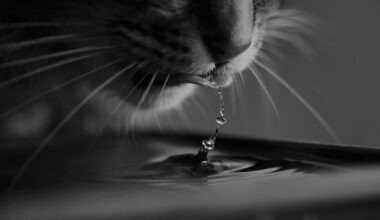The Role of Pet Trusts in Euthanasia Decisions for Cats
Choosing to euthanize a pet is one of the most difficult decisions a cat owner can face. Understanding the legal implications surrounding this sensitive topic is essential. Pet trusts play a significant role in ensuring that pets receive the care they deserve even after their owners are gone. A pet trust is a legally enforceable arrangement that specifies how to care for pets, including decisions regarding euthanasia. It’s vital for pet owners to clearly outline their wishes regarding end-of-life decisions in the trust document to prevent confusion and disputes. This document can designate a caregiver and define the circumstances under which euthanasia could occur. Furthermore, local regulations may also impact these decisions. Seeking legal advice when drafting the trust can ensure that it meets all necessary legal requirements. This approach promotes peace of mind for pet owners during challenging times. Not only does this provide clarity on health decisions, but it also addresses financial aspects. Therefore, understanding the significance of pet trusts is crucial not just for legal protection, but also for emotional assurance and continuity of care.
When contemplating the use of a pet trust, it is essential to consider the potential benefits they offer for both pets and owners. First and foremost, a pet trust guarantees that resources are allocated for the care of a cat throughout its life, regardless of the owner’s circumstances. This arrangement alleviates concerns about what happens to the pet if the owner becomes incapacitated or passes away. A well-constructed trust specifies the funds to be used for veterinary care, food, and shelter, ensuring the pet’s well-being. Additionally, the trust can outline procedures for euthanasia, specifying when it may be deemed appropriate. Such clarity helps caregivers make difficult decisions during distressing times. Another benefit is the reduction of family disputes about the care of the pet after the owner’s death. By having legally documented instructions, family members are less likely to be in conflict over the proper course of action. Furthermore, trusts can also provide detailed preferences regarding post-euthanasia arrangements, such as whether cremation or burial is preferred. This foresight can lead to a smoother transition for both the pet and the family.
Legal Considerations Surrounding Pet Trusts
There are important legal considerations to keep in mind when creating a pet trust for cats. Firstly, it’s critical to understand that not all states recognize pet trusts, so confirming local laws is essential. In jurisdictions where pet trusts are valid, the trust can be structured to provide care for a pet even after the owner’s death. Basic information to include is the name of the pet, specific directives for care, provisions for creating a trust fund, and identifying a trustee to manage the assets. Trustees are responsible for ensuring that the pet’s needs are met according to the grantor’s wishes. Another legal aspect to consider is the age and health of the pet at the time the trust is created. Pets may develop health issues that can influence their care decisions. Consequently, setting expectations for euthanasia may involve consulting veterinarians. This highlights the importance of including flexible provisions in the trust to accommodate potential needs or changes over time. Through effective legal planning, owners can provide ongoing support for their beloved companions, regardless of what the future holds.
Additionally, pet owners should consider the individual needs of their cats when drafting a pet trust. Each pet has unique medical requirements, behavioral traits, and preferences that must be taken into account to ensure a high quality of life. By documenting individual healthcare instructions, toy preferences, dietary needs, and other essential factors, owners can help caregivers provide the best possible care. It is worth consulting with veterinarians and pet care professionals to gather detailed insight that could impact future decisions, including euthanasia. Pet trusts may also require continual updates to addresses changes in the companion’s health or living situations. For example, if a pet develops chronic health issues, the trust should allow for more frequent veterinary visits or specialized treatments. Furthermore, establishing a clear communication channel with designated caregivers guarantees they are aware of the owner’s wishes and the intricacies of the trust. This will clarify any decisions surrounding end-of-life care and create an environment focused on compassion for the pet’s needs.
Emotional Considerations in Euthanasia Decisions
While legal aspects of pet trusts are crucial, the emotional factors surrounding euthanasia decisions cannot be overlooked. Pet owners often experience grief and guilt when faced with the decision to euthanize their beloved cats. The stress of making such choices can lead to hesitation, causing prolonging suffering for the pet. Therefore, documenting preferences and having a trust in place can provide clarity and assist in alleviating emotional turmoil during distressing moments. Understanding the signs of suffering or declining quality of life can aid caregivers in making informed decisions about euthanasia. Furthermore, trusted veterinarians can serve as vital support systems to help assess the situation objectively. Engaging in open, honest discussions about end-of-life scenarios in advance can prepare both owners and caregivers emotionally. By having these discussions before a crisis occurs, it allows families to advocate for compassion in a time of emotional vulnerability. The trust can also relieve such burdens by defining scenarios when euthanasia is appropriate, emphasizing the shared goal of the pet’s comfort and peace. In this way, planning about euthanasia can be approached with care and sensitivity.
Moreover, understanding the potential impact of euthanasia on the owner and the family is crucial. Loss of a pet can elicit a powerful emotional response, and families should anticipate this reality. Comprehensive emotional preparation through conversations and trust documentation can help family members cope with the loss more effectively. Establishing rituals or memorials can provide families with closure and encourage healthy grieving processes. Including family members in discussions regarding pet care and euthanasia also fosters a supportive environment. Additionally, recognizing external resources such as counseling services or pet loss support groups can also be beneficial. Encouraging family members to express their feelings and providing a forum for discussion can ease the burden of this painful decision. The pet trust itself may include consideration for memorializing the pet, whether through a burial or cremation, aligned with the owner’s wishes. Ultimately, discussions and planning surrounding euthanasia should encompass compassion, understanding, and a focus on honoring the pet’s life while respecting the emotional dynamics within the family. This comprehensive approach solidifies the role of pet trusts in supporting difficult decisions.
Conclusion on Pet Trusts and Euthanasia
In conclusion, pet trusts serve as valuable tools to facilitate informed euthanasia decisions for cats while addressing legal, emotional, and practical considerations. By thoughtfully creating a trust that reflects individual pet needs and owner wishes, families can ensure their cats receive proper care throughout their lives. Importantly, pet trusts not only reinforce the financial aspects of pet care but also serve as emotional safety nets during painful transitions. Effective planning allows owners to focus on their pet’s welfare without the added stress of navigating uncertainties or conflicts within the family. Establishing clear directives within a pet trust empowers designated caregivers to act confidently, aligning decisions with the owner’s intentions. Additionally, addressing the emotional implications of pet loss and euthanasia allows families to be better prepared for such moments. Taking time to appreciate the lasting bond with pets, documenting care preferences, and fostering communication can ease the emotional weight during challenging times. Ultimately, pet trusts serve as important instruments, enhancing the overall well-being of pets and helping families navigate the intricate journey of pet care and end-of-life decisions.
By integrating the legal framework of pet trusts into the realm of euthanasia decisions, pet owners and caregivers can collaborate more effectively to prioritize the pet’s well-being. This synergy affirms the pet’s dignity and comfort during their final days while reinforcing the owner’s intent. It is the ultimate expression of love and responsibility. Pet trusts not only make provisions for care but also denote the respect given to an animal’s life by formalizing an owner’s wishes. They encapsulate the sentiment of wanting the best for the beloved cats even after the owners’ passing or incapacity. As society increasingly recognizes the importance of animal welfare, these arrangements will become ever more pertinent. Encouraging conversations about the joys and challenges of pet ownership is essential in fostering awareness surrounding these decisions. Embracing the complexities of pet trust-related euthanasia can pave the way for more humane, humane approaches to managing transitions. Therefore, all cat owners are urged to consider their options in pet care planning from a holistic viewpoint, embracing the practicality and emotional aspects of their relationship with their pets. A well-articulated plan can illustrate the love and care they cherish.





